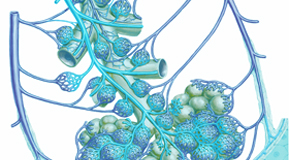

Medical cardiopulmonary testing gases (also known as medical lung test gases) consist of gas mixtures containing a tracer gas. During the test, the exhaled gas is analysed and differences in the concentration of the tracer gas can be used to measure pulmonary function or lung blood flow. When used in conjunction with diagnostic equipment, these gas mixtures measure different functions of the lungs to help in assessing patients with serious lung disorders such as asthma, chronic obstructive pulmonary disease or interstitial lung disease.
A typical lung function gas comprises a mixture of carbon monoxide and helium with the balance being oxygen and nitrogen. The carbon monoxide is used to test the transfer functionality of the lungs, and helium helps to determine lung volume.